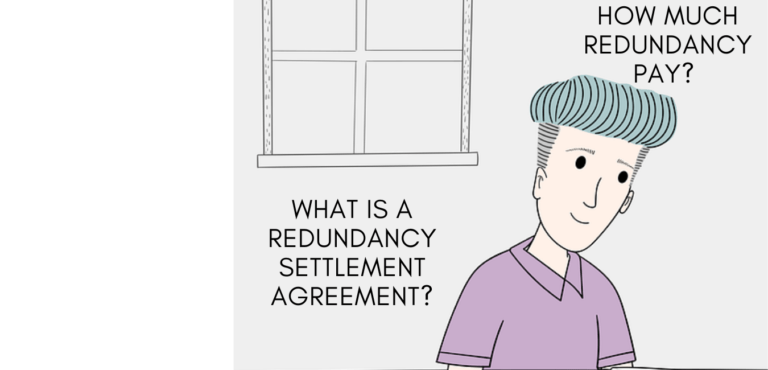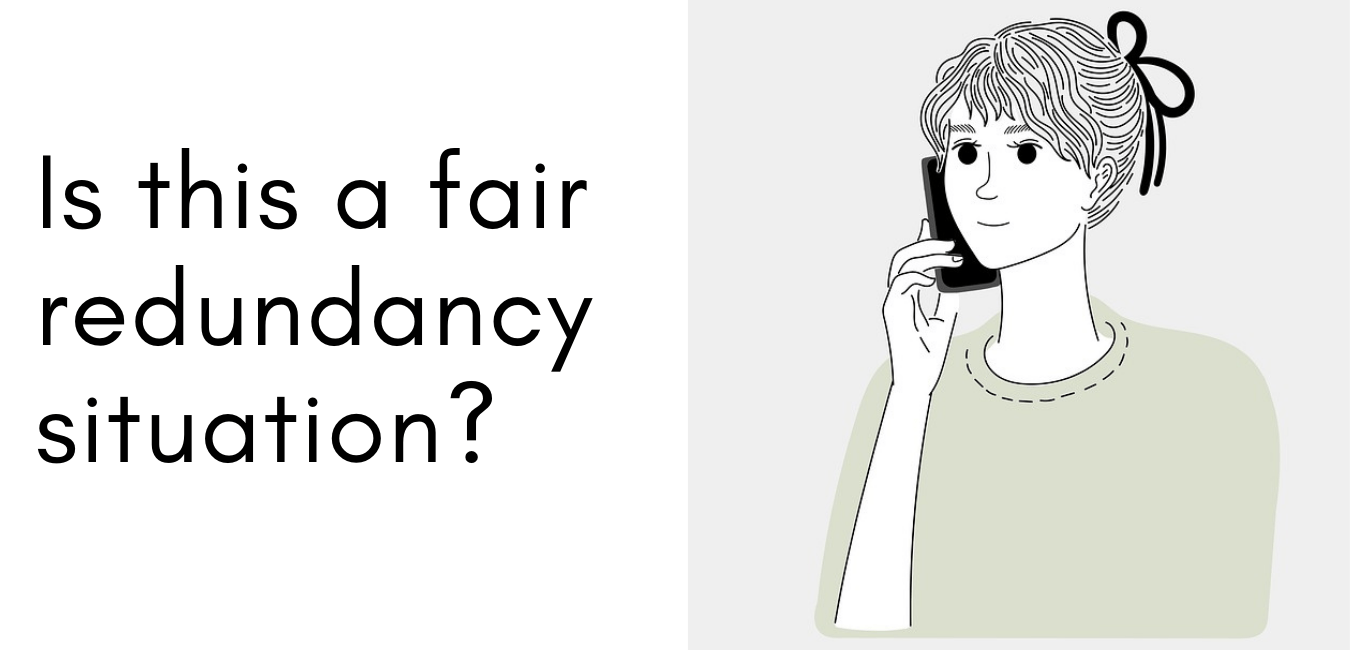Redundancy and Settlement Agreements
UPDATED MAY 2021
Being made redundant?
Okay, there’s no getting away from it – losing your job during a pandemic is hard. This guide, written by an expert solicitor, sets out simple steps to help you with your redundancy settlement agreement offer.

RULE 1: Don’t panic. Remember this is not your fault.
RULE 2: However scary, embrace this current reality and prepare for the next phase of your career.
RULE 3: A redundancy settlement agreement can bring tangible benefits but make sure the deal is right for you and get the agreement checked off by a specialist employment solicitor.
For free no obligation and confidential chat about your situation call us on 0800 088 4021.
Contents
- Why do employers use redundancy settlement agreements?
- Should I stay or go?
- What’s the alternative?
- What is a fair redundancy settlement?
- Redundancy FAQs – What is redundancy and how does it work?
1. Remember the ‘why’.
Why do employers use redundancy settlement agreements?
Employers use settlement agreements because they are fast, efficient and offer a clean risk-free break. The employer pays the employee more than their basic statutory and contractual entitlements in exchange for which the employee leaving quietly and often quickly, without the fuss of a full redundancy consultation process or risk of a tribunal claim.

Voluntary redundancy settlements:
The employer asks for volunteers to apply for redundancy with an enhanced redundancy package. You apply successfully and your employer asks you to sign a settlement agreement. You then need advice on the agreement from a solicitor. The solicitor will sign it off (if you’re happy to accept) and the agreement then becomes a binding settlement agreement.
The early redundancy settlement offer:
Your employer calls you in, without prior warning and informs you that your job is at risk and they would like to offer you an enhanced package under a settlement agreement. If you accept, you leave, often pretty quickly. If you decline, your employer will then start the redundancy consultation. If you are subsequently made redundant without a settlement agreement you usually get the basic statutory redundancy payment and notice under your employment contract.
The late redundancy settlement agreement offer:
Your employer starts a redundancy consultation process. Then, part way through, or even after it has come to its decision to end your employment due to redundancy, it gives you the option of an enhanced redundancy package if you sign a settlement agreement.
The post dismissal redundancy settlement agreement:
After you are told you will be made redundant, you challenge the decision or raise an appeal, and the parties agree to a settlement. Sometimes by this stage the employee has already started ACAS early conciliation and the deal is recorded under an ACAS COT3 agreement or a settlement agreement.
In a redundancy situation, employer’s often use settlement agreements when they are paying the employee an enhanced termination payment (i.e. more that the statutory minimum redundancy payment).
Example Redundancy Settlement Discussion
Employer: Hi Alex – unfortunately due to the pandemic and a downturn in work your role is at risk of redundancy. If you are made redundant you statutory redundancy pay would be £5,440 and plus 8 weeks notice. We’d like to bump that up and offer you £8,000 plus your notice – and agree a leaving date at the end of the month. If you accept that offer we would record everything under a formal settlement agreement. This is a voluntary and if you don’t want to accept this offer we will carry on with the redundancy consultation and discuss with you if there are any alternatives or ways of avoiding redundancy. If you turn down this enhanced offer and you are made redundant, you will only get the statutory redundancy payment and your notice – not this enhanced offer.

Employee / Alex: Okay, the extra money would be appreciated, I think I’d like to accept the offer but can I have a think about it.
Employer: Yes, we will get the agreement out to you by tomorrow and you will need to find a solicitor to advise you on the agreement and we will pay for you to get that solicitor advice. If you want to accept we will need the signed settlement agreement back by [date] otherwise we will continue with the redundancy process.
Employee A (thinks): – oh, I don’t think this is fair and I wanted to take the money and bring a claim a tribunal. What do I do?
Employee B (thinks) – I wouldn’t bring any claims anyway and if I’m going to go I might as well take the deal.
Meeting ends.
Tip: Do not assume the settlement is being offered because the employer is worried they’ve done something wrong that could land them in a tribunal. Yes, that might be true, but in redundancy settlement situations, many employers use settlement agreements a matter of course.
2. Should I stay or go?
Have you decided to leave and it’s just about getting the best terms – or would you like to stay employed if that’s viable?
My preference is to leave with a redundancy settlement agreement:
There are lots of reasons why you might want to accept a redundancy settlement:
- You’ve been planning to leave anyway.
- You’ve another job offer lined up.
- You want to be a consultant or set up your own business.
- You’ve not been happy at work.
- You think you will get another job quickly.
- The financial terms are pretty good.
- Accelerated receipt compared to a tribunal claim that will take months.
- Closure and certainty.
- A job reference and amicable exit.
My preference is to stay:

Entering into a redundancy settlement agreement is completely voluntary. If you reject the deal and carry on with the redundancy consultation you may still be made redundant at the end of the process – with an inferior redundancy payment.
Be objective about your chances of retaining your job at the end of the consultation.
Asking some of these questions might help?
- A redundancy pool of one – if your role is unique and you’re not being scored against others in a pool, how realistic a chance is there you can convince your employer it would be a mistake to remove your role? Think about the underlying reasons your employer is relying on to support the proposal.
- Alternative roles – Are there (a) suitable (b) available and (c) alternative roles you would like to apply for? Be realistic about (a)-(c). Your employer is not required to make a new job for you, or other you a role that is not suitable.
- Scoring mistakes – Do you think your employer has made an obvious mistake with your scores that you can prove. For example, they have said you had 6 days sickness absence but that’s wrong – as 2 of those days were due to emergency because your child was ill. If your employer has given you a 3 out of 5 for your skills, and you think you should be a 4 out of 5 say, is that something you think you can demonstrate with evidence – and even if you can, will it make a difference to the outcome (i.e. will you still be provisionally selected as one of the lower scoring employees in the pool)?
- Personality issue – do you suspect your boss doesn’t like you or someone else is a favourite and that’s behind your redundancy selection? Okay, maybe you’re right, but is it realistic to think your employer is going to accept that’s the case? Do you have evidence? Even if you do, will that make a difference? Would it be better to work on negotiating a better redundancy settlement?
3. What’s the alternative?
Life is about choices and options. Being offered a settlement agreement is one option. You can accept, reject or negotiate.
Accept:
You will need a solicitor to advise you on the agreement and check it’s right for you.
Reject:
If you reject the redundancy settlement, what are the alternatives?
- Is there a suitable alternative role in the same company?
- Do you have a good chance of securing a commensurate role with a new employer?
- How long will it take you to secure a new role?
- Are you going to set up on your own / will the redundancy payment help to fund that?
- Do you have restrictive covenants (post-termination restrictions) in your employment contract that will make it harder to secure a new job quickly in the same industry?
- Employment tribunal – do you have a reasonable chance of success and how will you cover the legal costs and can you afford to wait for a Judge to consider your case?
Important note: In 2021 many regional employment tribunals are experiencing considerable delays in getting claims to a final hearing before a Judge so you might need to wait a year or more.
Negotiate a better redundancy settlement:

If you think you have a genuine chance of convincing your employer to re-think the proposed redundancy you might be prepared to lose the enhanced settlement deal. But be realistic and objective.
Other times, redundancy could be the worst timing – and you may be fearful about securing a new job quickly – or at the same level of seniority.
Redundancy Examples:
Unique role:
You perform a senior unique role in the company which has been placed at risk. Your employer’s driver is to save costs. In this situation, unless there is a suitable alternative role available, it may be difficult to keep your job.

Pool of employees:
If you are in a pool of employees and you have scored low enough to be one of the unlucky ones that’s been provisionally selected for redundancy, you might be able to persuade your employer to increase your scores. Has your employer got the maths wrong or got something fundamentally wrong, like scoring your absence record as worse than it is? If you’re substantially below the threshold for being safe from redundancy, things get tougher to turn round.
Enhanced voluntary redundancy settlement agreements
Some employers will ask for volunteers for redundancy. Usually, you are told what the financial enhanced severance package is- and then you decide whether to apply. If your application is successful, the chances of you improving the redundancy severance further, from that point, are low.
If your employer has approached you with a proposed redundancy settlement agreement offer, you may be in a better position to negotiate improved terms. Deciding whether to negotiate will depend on a few factors:
- Do you have 2 or more years service entitling you to bring a claim of unfair redundancy?
- Is your employer applying a standard enhanced redundancy payment formula it uses?
- How does the offer compare to the potential value of claims.
- Are you being asked to work your notice / does your employer need you to finish off an important project / piece of work?
But if you’ve applied for a voluntary settlement, you should have been told the financial terms.
4. What’s a fair redundancy Settlement?
This is the sixty four million dollar question and if you feel the deal is unfair we recommend you speak to one of our solicitors to get some advice. Here are 5 things to consider:

- Does the deal include your full notice entitlement?
- Has your employer correctly calculated your statutory redundancy entitlement?
- Is there a contractual enhanced redundancy scheme and if so has your employer applied that correctly?
- On top of your basic contractual and statutory entitlements to notice and redundancy pay, how much are you being given? Working this out gives you the true financial value you getting in exchange for waiving your rights.
- What else are you getting that you would not otherwise get – for example, a reference, or chance to not work your notice and be paid in lieu, or retention of company car?
- If you’ve bene treated badly and think you have employment claims, what are they realistically worth and how likely are you to succeed?
Tip: Try our Settlement Agreement Calculator.
Redundancy FAQs
Redundancy means the employer has a reduced need for employees performing a particular kind of work. This might be because the workplace is closing down or there is less work or the way work is undertaken can be re-organised or re-allocated.
If you have two or more years continuous service you are entitled to a statutory redundancy payment. You can calculate how much using this government redundancy tool. Your employer may also operate an enhanced redundancy scheme with its own formulae work out your redundancy pay. Ask you employer, check your company handbook, if you are unsure.
To avoid making compulsory redundancies some employers will ask for volunteers. If you volunteer your employer may accept your application but it does not have to accept.
This is where the employer has an enhanced redundancy payment scheme that is a contractual right. It may be an express right, incorporated into your employment contract or a collective agreement negotiated by a trade union. Alternatively, through custom and practice there may be a implied right to an enhanced redundancy payment.
In practical terms, the next payroll after your employment ends. However, a redundancy settlement agreement should specify when exactly.
This is when the employer claims to have a redundancy situation but there is not one in reality or the reason you are being dismissed is for some other reason, for example, poor performance.
When an employer formulates a redundancy proposal it should identify the roles that are affected by the proposal. Those affected roles are placed in the redundancy pool.
If you have two or more years service you have accrued the right not to be unfairly dismissed. If your employer cannot show it had a potentially fair reason to dismiss i.e. redundancy the dismissal will be unfair. If the employer fails to meaningfully consult or follow a fair procedure, this make the dismissal unfair. A fair procedure entails identifying a reasonable pool, consulting on alternatives, offering any suitable alternative available roles – and where the employer needs to select from the pool, following a fair selection and scoring process.
There are also some reasons that are automatically unfair, for example, selecting an employee because they are a whistle blower.
Usually awards are capped at one years pay or the maximum – currently £89,493 for dismissals that take place on or after 6 April 2021. If your redundancy dismissal is discriminatory or automatically unfair compensation is potentially uncapped. It is important to note that compensation is for losses actually suffered or likely to suffer. In reality, many awards are relatively modest because an employee may have secured new employment to reduce their loss of earnings.
The employer should consider which roles are the same or sufficiently similar – or possibly interchangeable – when deciding which roles should be in the redundancy pool.
An employer should use selection criteria and avoid excessive subjectivity. The employer then needs to have a fair system of scoring each employee in the pool and should consult the provisionally selected employees about their scores, before making a final decision.
Yes, but selecting you because you are pregnant is unlawful and automatically unfair. If you are on maternity leave you have special protections and should be offered any suitable alternative in preference to other employees.
If the role you are offered is suitable – and you unreasonably reject it, you are at risk of losing your entitlement to a statutory redundancy payment. The operatives words here are ‘suitable’ and ‘reasonable’. There are often good reasons why a potentially suitable role is reasonably rejected.
If you have a disability that your employer knows about or reasonably could have known about, any disadvantage you suffer that can reasonably be reduced should be made. This might mean changes to the way your employer conducts the redundancy consultation and/or the criteria / scores it uses. Sometimes, for example, it may be reasonable to discount disability related absences if absence is a criterion in the redundancy selection matrix.
Enough to be reasonable! That might mean one meeting or several meetings. 
Where an employer proposes to make 20 or more redundancies in a 90 day period, the employer is required to consult with employee representatives, in addition to conducting consultation with affected employees individually.
If an employer has a duty to collectively consult but fails to provide information and consult properly, a protective award of up to 90 days pay can be made by an employment tribunal, for each affected employee. A protective award is in addition to any other compensation awards for unfair dismissal.
Outplacement is career support to help those employees transition into new alternative employment. Some employers provide employees with outplacement by engaging an outplacement provider.
Employees are not usually entitled to a reference but it is usually employers will be happy to provide a reference, on request. Read our guide about references and settlement agreements.
It is a legal requirement to obtain independent legal advice from a qualified adviser, for example a solicitor or barrister, on a settlement agreement. If you have not been offered a settlement and you feel your redundancy is unfair or discriminatory, we recommend you seek professional legal advice to help you secure a settlement, or if necessary, bring an employment tribunal claim.
Speak to a solicitor today about your situation.
If you need confidential legal advice from a friendly employment solicitor, call us on 0800 088 4021 or request a call back – for free no obligation chat about your situation.